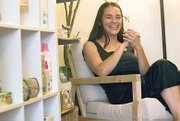Boutique Takes 'Green' Fashions to Freeway Crowd
Delilah Snell came tantalizingly close to owning a captive audience when she opened her environmental lifestyle store The Road Less Traveled on July 15.
The 350-square-foot boutique is across the street from a freeway on-ramp in Santa Ana, Calif., and it seems to offer motorists a stark visual choice. They can keep their eyes trained on the often-gridlocked freeway below the on-ramp. Or they can peer into the beckoning oasis promised by her boutique.
Snell often changes her window display of environmentally friendly fashions and home wares in hopes that the captive audience will look her boutique’s way for more than a fleeting moment. And even if they do not, the first-time entrepreneur, activist and part-time waitress believes that a burgeoning market for environmental products will help make a path to The Road Less Traveled.
If a market has been proven for organic groceries and restaurants, Snell said, eventually organic food patrons and others will want to expand the scope of their lifestyle and demand clothes made of organic cotton and hemp.
Sales for organic garments have been increasing, according to The Organic Exchange. The Oakland, Calif.–based market research group published a report May 4 stating that U.S. sales of garments made from organic cotton increased 55 percent annually from $86 million in 2001 to $275 million in 2005. These numbers encompass sales of products from major manufacturers such as Nike and American Apparel, as well as smaller fashion labels, according to the report.
Although Snell’s fashion sales have been strong, the boutique’s initial bestsellers have been home wares such as bamboo placemats and sporks. However, men’s and women’s fashions take up the middle section of the store. Price points for the environmentally friendly fashions range from $24 for organic cotton T-shirts from Andrews, S.C.–based Bamboosa to $70 for hand-dyed tutu dresses by Cristina Castellanos of San Diego.
The Road Less Traveled also sells garbage bags, cleansing fluids and lamps made of environmentally friendly materials. Snell hopes eventually to expand the size of the store, which environmental designer Rachel Hulan decorated with chandeliers and tree branches.
Snell financed the venture with savings from her waitress job. It should mix the best of entrepreneurial and activist worlds for her. “People are going to spend money,” Snell said. “But I’m going to give them ethical options when they spend money.” —Andrew Asch






















